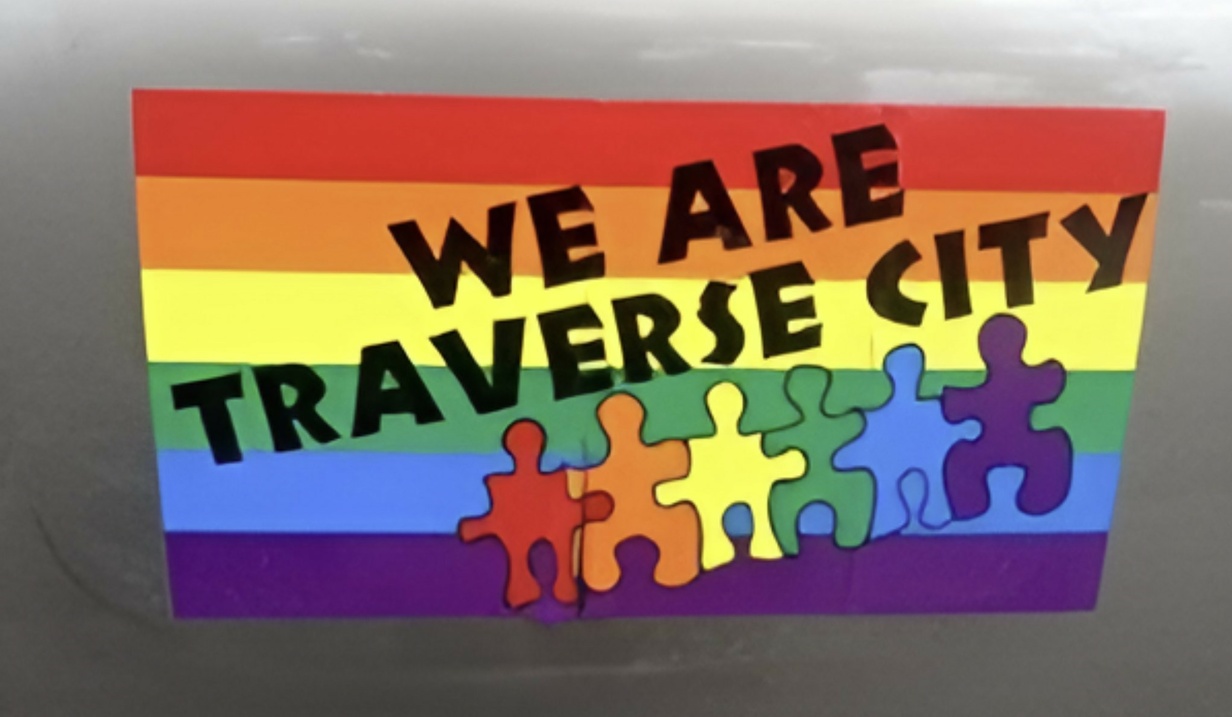
The Ballot Box, Part 3: We Are Traverse City
By Craig Manning | Oct. 20, 2024
In last week’s installment of The Ballot Box, The Ticker’s miniseries about elections from Traverse City’s history, we told you about Margaret Dodd’s journey to become TC’s first popularly-elected female mayor. What we didn’t tell you was that the mayoral race was only part of what made the 2001 election such a contentious one in Traverse City. Also on the ballot that fall? A controversial proposal that, had it passed, would have barred city commissioners from adopting anti-discrimination protections for gay, lesbian, or bisexual people.
Incidentally, that particular debate originated with Dodd, who proposed in 2000 that the city try to brand itself as a more diverse and accepting place to live. At the time, Traverse City was in the midst of a rash of hate crimes, ranging from cross burning incidents to the vandalism of mailboxes belonging to Jewish people. In September of that year, a trio of neo-Nazi skinheads assaulted a bartender at SideTraxx, the only bar in the city that catered to the LGBTQ+ population.
In response, Dodd and the Traverse City Human Rights Commission came up with the idea for a rainbow-colored bumper sticker, which showed six anthropomorphic puzzle pieces – each a different color – fitting together in harmony. “We Are Traverse City,” the stickers proclaimed. Soon, the city had affixed the stickers to all government vehicles, including police cars and fire trucks.
While Dodd was adamant that the stickers weren’t just “a gay thing” – they were “designed to show solidarity with all the minorities who have been under attack,” she told the Associated Press – the rainbow design still caused an uproar. City offices were inundated with angry calls and letters, and the issue even drew the ire of the American Family Association, a conservative Christian group that, per the AP, accused city officials of “endorsing sexuality.” On the advice of legal counsel, the city removed the stickers from all government vehicles, selling the remaining stock to a local civil rights group.
The city’s capitulation didn’t stop the uproar. Soon, a group calling itself “Traverse City Citizens Voting Yes for Equal Rights Not Special Rights” was circulating petitions in hopes of placing a charter amendment on the November ballot that would stop the city “from adopting laws or policies that grant special ‘minority’ or ‘protected class’ status, hiring quotas, or other preferential treatment to individuals who engage in homosexual behavior.” The group argued that adopting such policies would lead to discrimination against people who opposed homosexuality on religious grounds or for other reasons. The petition garnered enough support to put the matter in front of voters, in the form of that year’s “Proposal 1.”
Between the divisive Proposal 1 and the first mayoral election in Traverse City in 60 years, November 2001 set voter turnout records. According to contemporaneous reporting from the Traverse City Record-Eagle, roughly 11,000 city residents were eligible to cast a ballot in that election, and 46.5 percent of them voted – up from just 11.5 percent two years earlier. Those voters rejected Proposal 1 handily, 2,944 votes to 2,152. Blake Ringsmuth, then the chairman of the Traverse City Human Rights Commission, praised the decision, proclaiming that that said “wonderful things about our community: that we're caring and tolerant and that hateful attitudes are not endorsed.” Meanwhile, Phil Orth, who narrowly lost the mayoral race to Dodd, speculated to the Record-Eagle that his support for Proposal 1 had cost him the race.
The rejection of Proposal 1 kept the door open for the city’s non-discrimination ordinance, which city commissioners unanimously approved in October 2010. That ordinance prohibits discrimination on any grounds, including race, religion, or nationality, but adds sexual orientation and gender identity to the list – issues that weren’t addressed in state or federal civil rights laws at the time.
The ordinance sparked yet another petition movement, led by Traverse City resident Paul Nepote. Speaking to the Record-Eagle at the time, Nepote argued that the city could not “legislate my acceptance of homosexuals” and had no business trying to do so. He also suggested that the ordinance was “being used as a linchpin for turning over the marriage protection act in Michigan” and otherwise propelling the “political agenda” of LGBTQ+ people.
Nepote garnered enough petition signatures to force a referendum of the ordinance on the November 2011 ballot. Once again, though, voters came out overwhelmingly on the side of supporting protections for LGBTQ+ people: 2,818 city residents voted to keep the ordinance, versus the 1,661 who voted for repealing it.
Traverse City’s anti-discrimination ordinance came into play last year when Christine Geiger, owner of a local hair salon, posted on Facebook that transgender customers were not welcome at her business. The post led multiple people to file discrimination complaints with the city on the grounds that Geiger’s words had violated the non-discrimination ordinance.
“The actions of one business owner do not reflect the values of the citizens of Traverse City,” Amy Shamroe, then mayor pro-tem and now mayor, said of the incident. “City residents voted almost two to one in support of protecting LGBTQIA+ rights in 2011. That is who we are. We are a community who welcomes all and stands with neighbors, especially our LGBTQIA+ folks as they find themselves under attack.”
Comment






